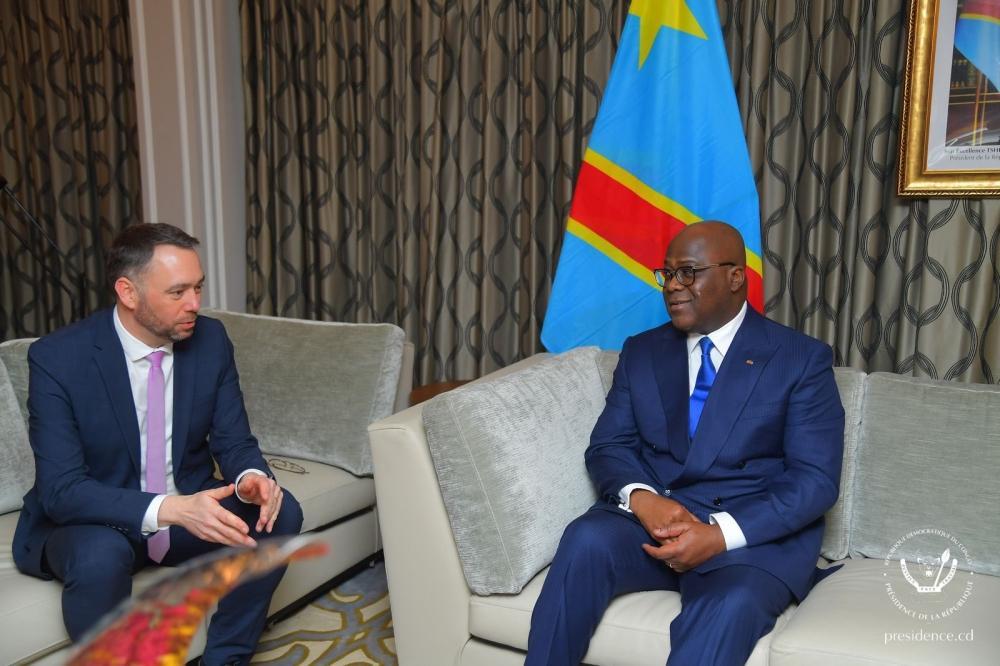Albert Rudatsimburwa
Africa-Press – Rwanda. The crisis in eastern DR Congo is one of those tragedies that feels like it’s stuck on repeat. And yet, here we are, witnessing a new chapter of chaos where the players and motives remain largely unchanged. While everyone claims to be working for peace, some actors seem more invested in finger-pointing than in finding solutions. Enter Belgium—and its Foreign Minister Maxime Prévot—with what can only be described as a masterclass in diplomatic doublespeak.
Prévot’s recent visit to Africa, framed as a mission to promote dialogue and peace, comes off as tone-deaf at best and hypocritical at worst. According to Belgium’s FPS Foreign Affairs, the minister is there to encourage “respect for dialogue and silence the weapons.” It sounds noble on paper. But let’s not kid ourselves: Belgium’s position in this crisis has been anything but neutral. For three years, it has tacitly supported Congolese President Felix Tshisekedi’s reckless policies, policies that have dragged the region deeper into conflict. To now preach respect for international law and human rights feels almost insulting to anyone paying attention.
Take, for example, Belgium’s repeated accusations against Rwanda. Prévot has gone to great lengths to portray Kigali as the villain, accusing it of violating territorial integrity and plundering minerals. This narrative conveniently ignores the Congolese government’s provocations. Tshisekedi has publicly declared his intent to destabilize Rwanda—a statement so brazen it’s hard to believe it didn’t make more waves internationally. Add to that the frequent shelling of Rwandan territory by Congolese forces, airspace violations, and the arming of FDLR—a group notorious for its role in the 1994 Genocide against the Tutsi in Rwanda and ongoing destabilization efforts. How does Belgium reconcile these realities with its supposed neutrality? The answer is simple: it doesn’t.
Consider what happened earlier this year. Late February saw an assault launched from Goma targeting the Rwandan border city of Rubavu.
The operation involved a staggering coalition of Congolese forces, FDLR militias, foreign mercenaries, and even troops from neighbouring countries. The attack left over a dozen Rwandans dead, hundreds injured, and significant property damaged. Predictably, this provoked a response from the AFC/M23, a group that has long been vilified but whose grievances, including the safety and repatriation of Congolese refugees, have been ignored for decades. Yet, Prévot and his ilk remain fixated on Rwanda’s supposed aggression, conveniently sidestepping Kinshasa’s role in fanning the flames.
But Belgium’s counterproductive influence doesn’t stop there.
Brussels has also misled the European Union, dragging it into a collective anti-Rwanda stance. By flaming Rwanda as the primary antagonist in the DR Congo crisis, Belgium has steered EU policy in a direction that undermines constructive engagement. A particularly baffling example of this is Belgium’s opposition to European support for Rwanda’s anti-terrorism efforts in Mozambique. Rwanda’s interventions there have been widely recognized as effective, yet Belgium’s stance seems driven more by a remotely controlled agenda from Kinshasa than rational analysis. This isn’t just about Belgium anymore; it’s about how the EU, as a whole, risks becoming an irrelevant actor in resolving the DR Congo crisis.
What’s most striking is how irrelevant Belgium’s posturing has become. While Prévot tours Africa, wagging his finger at Kigali, serious actors like Qatar and the United States are doing the real work. Their Joint Declaration, signed in Washington, tackles the root causes of the conflict: security, territorial integrity, refugee repatriation, and adherence to international law. This is the kind of balanced approach the region needs. By comparison, Belgium’s actions feel like a relic of a colonial mindset—paternalistic, out of touch, and fundamentally unhelpful. And with the EU now tethered to Belgium’s misguided policies, its credibility and relevance in Central Africa are equally at risk.
At this point, Belgium’s relevance in the DR Congo crisis is almost negligible. Prévot can deliver as many statements as he likes, but without acknowledging the full scope of the conflict’s complexities, he’s just adding noise to an already chaotic situation.
If anything, Belgium’s finger-pointing only deepens mistrust and complicates efforts to find a resolution.
And, unless the EU charts an independent and rational course, it too will be sidelined in favour of actors who prioritize real solutions over political posturing.
It’s time for Belgium—and by extension, the EU—to take a hard look at its approach.
Empty platitudes about peace and human rights won’t cut it.
The Great Lakes region needs honest brokers—countries willing to engage with all sides and address the root causes of instability. Until Belgium steps up, or steps aside, its role will remain what it’s been for the past three years: counterproductive and irrelevant.
Source: The New Times
For More News And Analysis About Rwanda Follow Africa-Press






